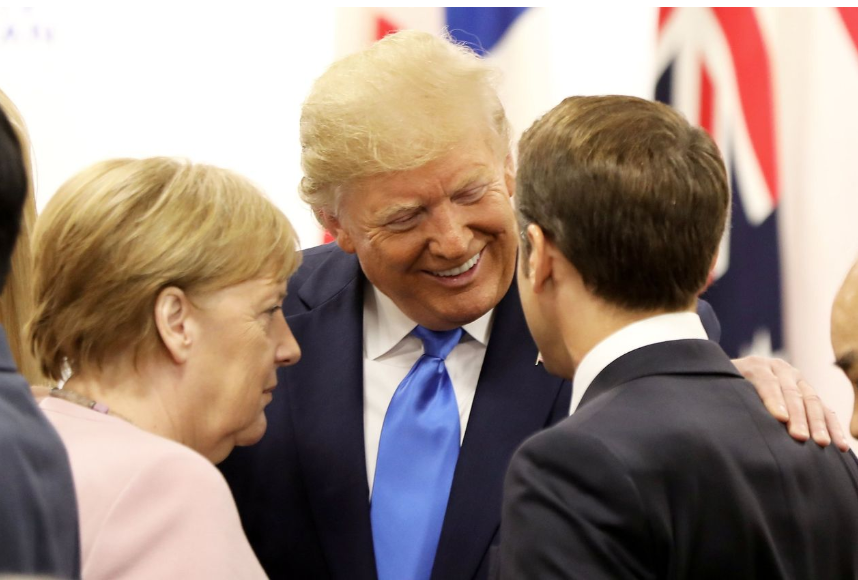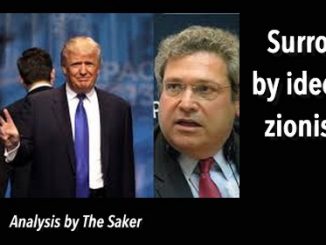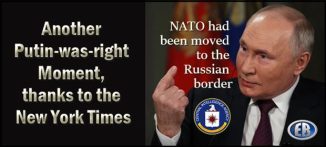
ER Editor: We’re running an update story on the EU3 applying the dispute settlement mechanism regarding the JCPOA (which will likely cause UN sanctions to be placed on Iran within 2 months) from Zerohedge, as well as Moon of Alabama‘s article below that from yesterday, detailing why the EU had let Iran down earlier under the terms of the deal, causing trading problems with Iran.
On balance, the EU3 appear to be no more than backstabbers to Iran, as MOA explains, obliging it to leave the JCPOA, thus giving the US a reason to declare war on it.
Is war with Iran the intended outcome?
To Iran FM Javad Zarif‘s question posed yesterday (see RT’s ‘Why do you allow the United States to bully you?’ – Iranian FM to Europe over nuclear deal tensions), it appears we have an answer from Zerohedge.
In the Western world, at least, the quality of our leadership is truly vile.
********
Trump Secretly Threatened Europe With Auto Tariffs If It Didn’t Declare Iran In Breach Of Nuclear Deal
A bombshell revelation from The Washington Post a day after France, Britain and Germany took unprecedented action against Iran by formally triggering the dispute resolution mechanism regulating conformity to the deal, seen as the harshest measure taken by the European signatories thus far. The European powers officially see Iran as in breach of the deal, which means UN and EU punitive sanctions are now on the table.
But according to The Post, how things quickly escalated to this point is real story: “Days before Europeans warned Iran of nuclear deal violations, Trump secretly threatened to impose 25% tariff on European autos if they didn’t,” says the report.
This came as a “shock” to all three countries, with one top European official calling it essentially “extortion” and a new level of hardball tactics from the Trump administration.

After the US leveraged the new tariffs threat according to the report, European capitals moved quick to trigger the mechanism, which involved the individual European states formally notifying the agreement’s guarantor, the European Union, that Iran is in breach of the nuclear deal.
This followed the Jan.6 declaration of Tehran’s leadership to no longer be beholden to uranium enrichment limits. And that’s where things got interesting as Washington’s pressure campaign dramatically turned up the heat on Europe.
“Within days, the three countries would formally accuse Iran of violating the deal, triggering a recourse provision that could reimpose United Nations sanctions on Iran and unravel the last remaining vestiges of the Obama-era agreement,” the report continues.
However, the report notes France, the UK, and Germany were already in deep discussion on moving forward with triggering the mechanism. “We didn’t want to look weak, so we agreed to keep the existence of the threat a secret,” a European official cited by WaPo claims.
Trump’s threats of auto tariffs to gain trade concessions with the Europeans is certainly nothing new, but using the same to dictate foreign policy is, notes WaPo’s diplomatic correspondent John Hudson.
Interestingly, in Wednesday’s joint statement, the European signatories attempted to distance their drastic action away from Washington’s so-called “maximum pressure” campaign. “Our three countries are not joining a campaign to implement maximum pressure against Iran,” they said.
The statement also underscored Europe hopes to use the mechanism “to bring Iran back into full compliance with its commitments under the JCPOA” and in the words of one official quoted in The Guardian to prevent nuclear advancement to the point that the Iranians “learn something that it is not possible for them to unlearn”.
Now that the mechanism has been enacted, the clock starts on 65 days of intensive negotiations before UN sanctions would be reimposed if no resolution is reached. Specifically, a blanket arms embargo would be imposed among other measures, and certainly it would mark the deal’s final demise, given the Europeans are Iran’s last hope for being equal partners in the deal.
Also interesting is that in the hours before The Washington Post report was published, Iranian FM Zarif charged that the EU investigation into Iran’s alleged non-compliance meant Europe is allowing itself to be bulled by the United States.
 Indeed the new revelation of the secret threats attempting to dictate Europe’s course appear to confirm precisely Zarif’s words to reporters earlier on Wednesday: “They say ‘We are not responsible for what the United States did.’ OK, but you are independent” he began. And then added a stinging rebuke: “Europe, EU, is the largest global economy. So why do you allow the United States to bully you around?”
Indeed the new revelation of the secret threats attempting to dictate Europe’s course appear to confirm precisely Zarif’s words to reporters earlier on Wednesday: “They say ‘We are not responsible for what the United States did.’ OK, but you are independent” he began. And then added a stinging rebuke: “Europe, EU, is the largest global economy. So why do you allow the United States to bully you around?”
Original article
********
Trump’s EU Poodles – Germany, Britain And France – Obey His Order To Kill The Nuclear Deal With Iran
MOON OF ALABAMA
The European poodles who co-signed the nuclear deal with Iran – Britain, France and Germany (the EU3) – have been told by the Trump administration to kill the agreement. Today they started the process to do so. The other co-signers, Russia, China and Iran, continue to support the deal.

bigger
In May 2018, the U.S. left the Joint Comprehensive Plan of Action, or JCPOA as the agreement is known, and reintroduced sanctions against Iran.
While the Europeans had said that they would continue to support the deal, they have succumbed to the threat of secondary sanctions the U.S. said it would impose against them if they trade with Iran. As all payments between Iran and its trade partners are impeded by the sanctions, trade between Europe and Iran has come essentially to a halt. The Europeans have attempted to set up an alternative trade facilitating instrument known as INSTEX. But the mechanism, which also imposes additional conditions on Iran, has failed to function.
The Europeans could have implemented several other measures to counter the U.S. sanction threat. They failed to do so.
In June 2018, Iran triggered the Dispute Resolution Mechanism of the deal (explained below) by sending an official letter to the coordinator of JCPOA Joint Commission. A Joint Commission meeting was held in which the EU3 again promised that they would hold up their side of the deal:
6.The participants recognised that, in return for the implementation by Iran of its nuclear-related commitments, the lifting of sanctions, including the economic dividends arising from it, constitutes an essential part of the JCPOA.
…
8.The participants affirmed their commitment regarding the following objectives in good faith and in a constructive atmosphere:
- the maintenance and promotion of wider economic and sectoral relations with Iran;
- the preservation and maintenance of effective financial channels with Iran;
- the continuation of Iran’s export of oil and gas condensate, petroleum products and petrochemicals;
But those promises were empty. Trade between Europe and Iran failed to revive as the European countries failed to stand up against U.S. sanctions. By succumbing to Trump’s secondary sanction threat, the Europeans effectively reintroduced their own sanctions against Iran.
A year later and in consequence of the failure by the Europeans to provide effective sanctions relief, as was promised under the JCPOA, Iran started to exceed certain limits the deal had set on its civil nuclear program. It justified the move by pointing to Article 26 of the JCPOA (pdf):
26. The EU will refrain from re-introducing or re-imposing the sanctions that it has terminated implementing under this JCPOA, without prejudice to the dispute resolution process provided for under this JCPOA. There will be no new nuclear-related UN Security Council sanctions and no new EU nuclear-related sanctions or restrictive measures. The United States will make best efforts in good faith to sustain this JCPOA and to prevent interference with the realisation of the full benefit by Iran of the sanctions lifting specified in Annex II.
…
Iran has stated that it will treat such a re-introduction or re-imposition of the sanctions specified in Annex II, or such an imposition of new nuclear-related sanctions, as grounds to cease performing its commitments under this JCPOA in whole or in part.
In five steps taken since, each two months apart, Iran began to use more modern types of Uranium enrichment centrifuges, increased the number of active centrifuges, raised the level of enrichment and exceeded other limits the deal had set. All these steps were done under the watchful eyes of the International Atomic Energy Agency (IAEA), which continues to observe and report all details of Iran’s program. All these steps can easily be reversed should the other signers fulfil their commitments under the deal.
Today Britain, France and Germany themselves triggered the Dispute Resolution Mechanism of the deal with a common letter:
The E3 have fully upheld our JCPoA commitments, including sanctions-lifting as foreseen under the terms of the agreement. In addition to the lifting of all sanctions, required by our commitments under the agreement, we have worked tirelessly to support legitimate trade with Iran, including through the INSTEX special purpose vehicle.
…
However, in the meantime Iran has continued to break key restrictions set out in the JCPoA. Iran’s actions are inconsistent with the provisions of the nuclear agreement and have increasingly severe and non-reversible proliferation implications.We do not accept the argument that Iran is entitled to reduce compliance with the JCPoA. Contrary to its statements, Iran has never triggered the JCPoA Dispute Resolution Mechanism and has no legal grounds to cease implementing the provisions of the agreement.
…
We have therefore been left with no choice, given Iran’s actions, but to register today our concerns that Iran is not meeting its commitments under the JCPoA and to refer this matter to the Joint Commission under the Dispute Resolution Mechanism, as set out in paragraph 36 of the JCPoA.
The approach is based on lies, extremely legalistic and unfair. Yes, technically the Europeans have lifted their sanctions. But at the same time they are imposing the U.S. sanctions against Iran. They do not buy Iranian oil or other products. They do not sell anything to Iran as payments from Iran are blocked. The outcome for Iran is no different than under the sanctions that were imposed before the deal was made. To point to the creation of INSTEX is laughable as no deals have been made under that mechanism beacause it only facilitates impractical barter deals and is restricted to certain products.
That Iran has “never triggered the JCPoA Dispute Resolution Mechanism” is an outright lie. The Joint Commission met on July 6 2018 at a ministerial level because Iran had triggered the mechanism. The Joint Statement issued after that meeting says so:
1. Upon the request of the Islamic Republic of Iran, a meeting of the Joint Commission of the Joint Comprehensive Plan of Action (JCPOA) was held on 6 July in Vienna at ministerial level. The Joint Commission met to discuss the way forward to ensure the continued implementation of the nuclear deal in all its aspects …
The Dispute Resolution Mechanism, laid out in article 36 and 37 of the JCPOA, foresees a short time discussion period about the grievances that triggered it. Should those discussions fail to find a solution, the issue is escalated to the UN Security Council. If the UNSC fails to vote on a resolution in favor of Iran, all UN sanctions that were imposed on Iran before the JCPOA deal was signed will be automatically reactivated.
The timeline for the process is tight. First the Joint Commission of JCPOA signer countries has fifteen days to find a solution. Then the foreign ministers of those countries have another fifteen days. Five days later, any JCPOA signer can escalate the issue to the UNSC. If the UNSC does not vote against the reintroduction of sanctions within 30 days, which the U.S. would surely prevent by using its veto right, UN sanctions against Iran will automatically snap-back.
As the EU3 now triggered the process 65 days from now, Iran is likely to be again under full UN sanctions.
The EU3 will, of course mealymouthed, explain that they want Iran to pull back its program so that it does not exceed any limit of deal. But why should Iran do that as long as the EU3 follow US sanctions against Iran and implement them against it? The EU3 have no reasonable answer to that question.
Iran has no real incentive to stick to the JCPOA limits as long as sanctions are upheld against it. When the UN sanctions snap back, it is likely to leave the JCPOA even if China and Russia continue to trade with it.
The outcome here is 100% predictable. UN sanctions will snap back. Then the Trump administration will relaunch the ‘nuclear Iran’ propaganda campaign and will threaten Iran with war.
The EU countries who failed to hold up the deal will now globally be perceived as the poodles they are. They will, like the U.S., be seen as ‘agreement incapable’ countries who fail to stick to the deals they make. Their utterly servile behavior towards the U.S. is disastrous for their reputation.
************
Original article

••••
The Liberty Beacon Project is now expanding at a near exponential rate, and for this we are grateful and excited! But we must also be practical. For 7 years we have not asked for any donations, and have built this project with our own funds as we grew. We are now experiencing ever increasing growing pains due to the large number of websites and projects we represent. So we have just installed donation buttons on our websites and ask that you consider this when you visit them. Nothing is too small. We thank you for all your support and your considerations … (TLB)
••••
Comment Policy: As a privately owned web site, we reserve the right to remove comments that contain spam, advertising, vulgarity, threats of violence, racism, or personal/abusive attacks on other users. This also applies to trolling, the use of more than one alias, or just intentional mischief. Enforcement of this policy is at the discretion of this websites administrators. Repeat offenders may be blocked or permanently banned without prior warning.
••••
Disclaimer: TLB websites contain copyrighted material the use of which has not always been specifically authorized by the copyright owner. We are making such material available to our readers under the provisions of “fair use” in an effort to advance a better understanding of political, health, economic and social issues. The material on this site is distributed without profit to those who have expressed a prior interest in receiving it for research and educational purposes. If you wish to use copyrighted material for purposes other than “fair use” you must request permission from the copyright owner.
••••
Disclaimer: The information and opinions shared are for informational purposes only including, but not limited to, text, graphics, images and other material are not intended as medical advice or instruction. Nothing mentioned is intended to be a substitute for professional medical advice, diagnosis or treatment.




